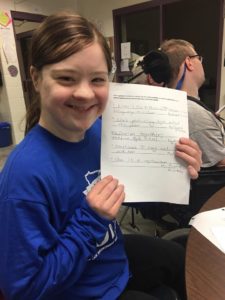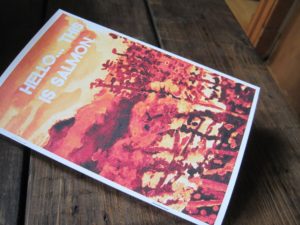Laura Berglund ’20
Cow Tipping Press is a small not-for-profit that offers creative writing classes for adults with developmental disabilities and publishes their resulting work. I learned about this organization through the Civic Engagement Center and taught two classes with them prior to interning last fall. My experiences brought issues of underrepresentation to my awareness. The organization’s literary focus nuanced my understanding of diversity by challenging dominant notions that people with developmental disabilities cannot create original works of art.

“Exact words only.” This concept is central at Cow Tipping, and I strove to apply it with each writing exercise I lead in class. Students often prefer telling their stories out loud while support staff, volunteers, or teachers transcribed. We cannot ask guiding questions or offer edits. Questions such as “What do you have to say?” or “Do you have anything else to say?” are the extent to which transcribers can influence a student’s piece. Students have the freedom to draw from prompts or example pieces at their own discretion, and it’s exciting to see the variety of pieces that result.
One of the most memorable exercises I facilitated was a response to Sarah Kay’s 2011 TED performance of her poem “If I Should Have a Daughter.” I framed this piece as a slam poem, but the majority of students saw it as a letter. They wrote pieces that offered advice and guidance and every student volunteered to share their epistolary poems at the end of the session. Students were usually reluctant to read in front of the class, so this level of enthusiasm caught me by surprise. I realized that honoring the words of others extends beyond accurate transcription. If the students didn’t have the freedom to apply their own interpretations of our example piece, fewer stories would have been voiced. Writers must find their own inspiration for their work to be meaningful to them, and this realization helped me to better understand why the Cow Tipping team often refers to students as authors.
Genre became even more fluid with my second class. I taught a small group that met at The Show Gallery, a gallery in Lowertown that exhibits work by artists of all abilities. We encountered new artwork each week and took advantage of this dynamic environment by writing art reviews. One of my most hesitant students, who often responded to questions of “What do you want to say?” with “I don’t know,” filled a page with details about a photograph of a gnarly tree. Meanwhile, another student decided to write a piece they described as fake news. They played with the meaning of journalism in the United States by creating a satire, set in a fantasy world, that commented on the June 2017 death of Otto Warmbier. The diverse pieces that emerged from a single prompt caught me off-guard.

Few organizations provide intentional spaces for people with developmental disabilities to explore the arts rather than crafts. Craft, in this context, would refer to projects such as following instructions to make a birdhouse. I understand arts and crafts as distinct concepts in that craft draws from established methods while art is contingent upon change. Change through diversification is an important aspect of Cow Tipping’s work, and I have a better understanding of how self representation can resist dominant conceptualizations of ability because of the time I spent with this organization. The transition from a nuanced worldview to authentic inclusion on the part of neurotypical communities poses another challenge. According to the Cow Tipping website, “83% of readers cite that Cow Tipping books change their fundamental perspective on disability,” but how we are to translate understanding into action is unclear. This is likely a familiar question for those of us who grapple with narratives both inside and outside of the classroom on a daily basis. The concept of “exact words only,” however, may offer a new approach.